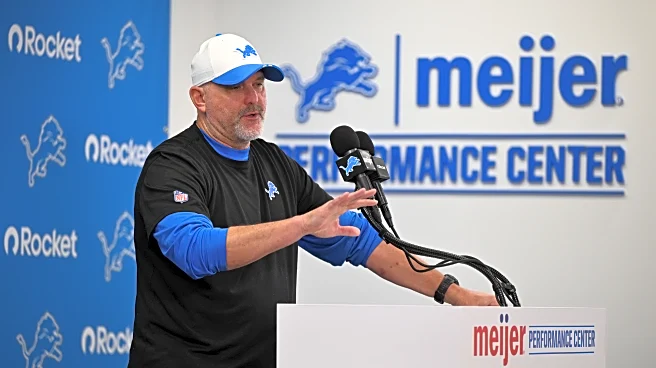The Detroit Lions coordinators took the podium on Thursday morning after the team’s tough loss to the Minnesota Vikings. While the coordinators have never shied away from honesty in their media sessions,
this felt turned up to 11. All three coordinators pointed to specific players or units that made mistakes against the Vikings, while also noting their faith in turning things around.
Here are eight takeaways from the media session.
Offensive coordinator John Morton
Protection is the key to everything
When asked what the toughest part of rewatching the poor offensive performance from the offense, Morton pointed to their inability to protect Jared Goff.
“The protection, that was the biggest thing,” Morton said. “I mean, we draw up all these plays we want, doesn’t matter. That was the biggest thing. Winning our one-on-one matchups; that was big. That set us back. Second-and-long, third-and-long. We had a lot of third-and-longs. But when we did things right, we did really well. That was the biggest thing. It just—clogging the middle up, protection. You can’t do a lot of stuff with that. And we all have our hand in that game plan, and we would do things differently next time.”
Goff was sacked five times against the Vikings, and PFF credited Minnesota’s defense with 26 pressures.
Execution—not communication or blitz identification—is the problem
Blame has been placed all around for the poor protection in the Vikings game. Some have blamed the scheme, some have blamed blitz identification, while others have pointed to the offensive line just not winning. Morton mostly blamed the final one.
“I think our communication has been really good. Ever since the Green Bay game, it’s been really good. It’s just a matter of some guys getting beat. That’s all it is,” Morton said. “I’m just telling you that’s—when you look at it over and over and over, it’s one or two guys that are just breaking down. And we’ve got young guys, and they’re still learning. And really, they shouldn’t be because we’re halfway through the season.”
When asked if they had trouble identifying blitzes, Morton, again, harped on execution being the bigger problem.
“No, the IDs have been good. I’m just saying, guys are breaking down,” Morton said. “And it’s one or two guys when you watch it. And we’ve got to collectively get it right.”
More Isaac TeSlaa coming
Stop me if you’ve heard this one before, but Morton believes they will get rookie receiver Isaac TeSlaa more involved this week after playing in just three offensive snaps vs. the Vikings.
“We’re going to get him the ball more. And that helps with the other guys, so they’re not always playing 65, 70 plays. But we’re real happy with where he’s at,” Morton said.
Defensive coordinator Kelvin Sheppard
In defense of Arthur Maulet
On the game-defining play against the Vikings, Maulet was lined up in man-coverage against Jalen Nailor on third-and-5. While in tight coverage, Maulet couldn’t make a play on the ball. Nailor caught it, and the Vikings were able to run out the rest of the clock.
On Thursday, Sheppard defended Maulet and said he’d put him right back out there for the same situation.
“Since we’ve had that player, Arthur Maulet, (he) put his head down and done everything we’ve asked. And he’s learned this playbook. He’s absolutely learned this playbook. [..] He stood up when asked,” Sheppard said. “I mean, he made a tremendous play in the Tampa game, everybody was talking about him like he was Deion Sanders. Then he gave up the pass, I’m seeing, ‘Why you do this, why that?’ No, if the game’s on the line, it’s going to be Arthur Maulet in press man, and he’s going to find a way to get the ball out of the basket.”
Still confident in the run game
Sheppard was quick to point to their run defense stats against the Vikings—29 rushes, 142 yards, 4.9 yards per carry—and dismiss them as misleading.
“The run game, that’s kind of a façade, it’s not real, those numbers that showed up. Because I was trying to search for where were those yards, and then I found out they added a 31-yard screen in as a run play. You take that out, they’re at 3.9 (YPC) on the day,” Sheppard said. “And then there’s 24 to 34 yards in there that’s just inexcusable. You’ve got guys at the point of attack to stop the ball, if not a TFL for a two-yard gain. Those plays have to be made, and those guys understand that, took full accountability to it.”
While Sheppard is right, a Vikings screen pass that was technically a lateral probably shouldn’t be a strike against the run defense; his stats are a bit misleading, as well. The Vikings had four kneel-downs that went for -5 yards on the day. So if you take away the screen pass and the kneel downs, the Lions still allowed 116 yards on 24 carries, or 4.8 YPC.
Still, the defensive coordinator is confident that going into Sunday’s game against a Commanders offense that ranks fourth in rushing yards per game (139.9) and third in yards per carry (5.1) that they will return to their run stuffing ways.
“If we have to go with a 10-man box and play with one post safety, those guys in the room, the coaching staff, everybody knows. If there’s one thing I believe in, it’s the physical identity of our defense. And that starts with the run game and our front seven,” Sheppard said.
Terrion Arnold, great in coverage, but run defense was “unacceptable”
Arnold is coming off a game where he notched three passes defended and tallied his first interception. Sheppard was quick to praise his growth in coverage, but also pointed out that his run defense was not up to standard.
“I absolutely see growth with the player in Terrion, absolutely,” Sheppard said. “In pass coverage, it’s been outstanding. He’s cleaned up some of the stuff at the top of the route, and (passing game coordinator/defensive backs coach) Deshea (Townsend)’s done an excellent job developing that player. But the part of TA’s game that I need to see improve is the run game and run support. It’s unacceptable right now, and he knows that.”
Special Teams coordinator Dave Fipp
Blocked field goal error
Fipp was not shy in pointing to Jake Bates’ kick trajectory as the primary reason for his 45-yard field goal getting blocked against the Vikings.
“Blocked field goal was just a low kick. There’s people who could’ve protected maybe a touch better, but at the end of the day, the ball just came off low,” Fipp said. “If you hit a ball that low, usually it’s going to be blocked as long as they put their hand up and their guy did a good job of getting his hand up there.”
So what went wrong with Bates’ technique?
“It looked like his foot caught the turf a little bit before the ball and probably hit off the ground and ricocheted up a little bit. So, he hit it high on the ball, which obviously is unfortunate,” Fipp explained.
Fipp believes the overall unit is actually still playing well despite Vikings game
Despite a game in which the Lions had a blocked field goal, allowed a deep kick return, and would’ve allowed a kick return touchdown had it not been for a holding penalty, Fipp actually thought they performed well in three other key phases of special teams. He pointed to their punt return (two returns, 15 yards), kickoff return drive start (avg. 30.8-yard line, and punt team (47.6 avg. two inside the 20-yard line) as three successes in the game.
In fact, he revealed that by his own statistical measures, the overall unit is still performing well, despite Sunday’s setback.
“I would say fairly decent,” Fipp said. “I’m not going to go into all of it, but I look at a lot of different things. I mean there’s – and it just depends on stuff like that. I’ll give you another example. Kickoff coverage, I think we have fourth or fifth most drive starts with our opponent inside the 20-yard line. Now, in the NFL, I think our kickoff return we’re like fourth in terms of fewest number of drive starts inside our own 20-yard line. I think we’re roughly like tenth-best when we’re returning the ball on our kickoff return. So, stuff like that. But yeah, we’re doing alright. Could we be better? For sure. We have a high standard and a high bar.”









